Many people use plastic containers or zipper bags for storing food in the freezer. However, glass is a more sustainable option. But glass breaks in the freezer, right?
There are a few ways to safely prepare a glass container to store food in the freezer. You can even put in glasses to chill so you can enjoy a frosty beverage after a hot day.
It’s a common experience to put a glass bottle or glass container in the freezer, hear a crack later, and know that your glass has shattered. You now have the task of cleaning up the broken glass from your exploding beer bottles.
A completely full glass water bottle will almost certainly explode if it spends too much time in your freezer. That situation is why so many people think you can’t freeze glass containers.
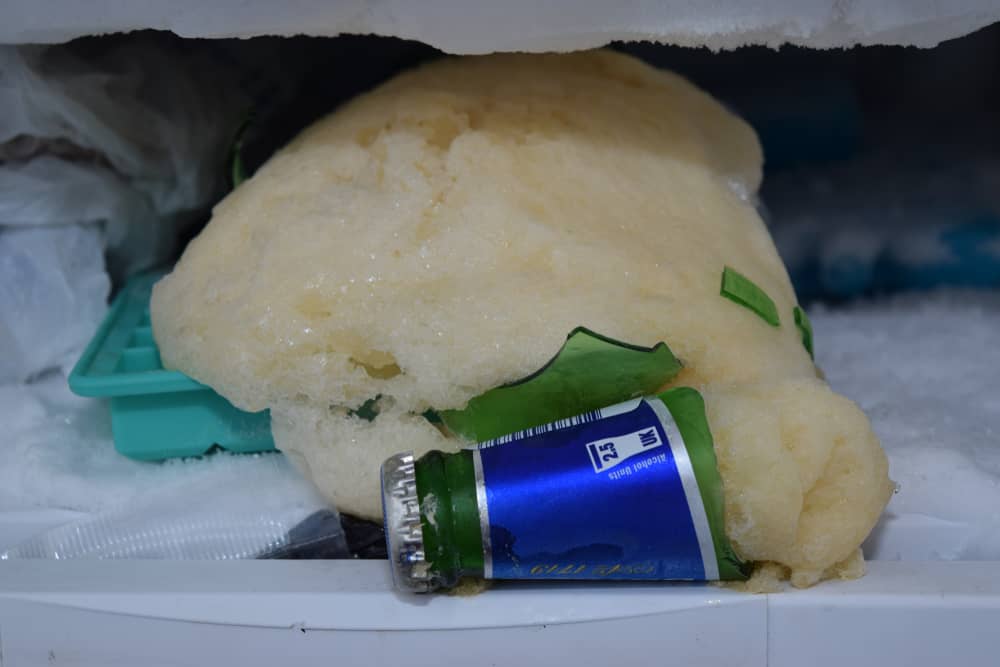
The pressure from the frozen beer made this glass bottle explode
You can follow specific guidelines to prepare the glass for the freezer and fill the container properly. Then you won’t risk the glass shattering. You’ll learn how to use glass containers and utilize your freezer storage space.
Read on to find out helpful information such as:
The short answer is yes. You can put glass in the freezer. But you have to follow specific steps to ensure you’re preparing the glass for this type of storage.
Putting a warm glass into the freezer almost guarantees it will explode. You should leave the glass on the counter to reach room temperature first.
Then you can put it in the freezer and know it will cool off slowly, preventing cracks.
Glass containers not filled to the brim will survive best in the freezer. As the contents freeze, they’ll expand.
A full container doesn’t have room for expansion, so that the glass will explode. By leaving an inch or two at the top of the container or jar, you’ll give the contents room to expand.
The main reason glass breaks in the freezer is thermal shock. Thermal shock is a rapid change in temperature that makes the glass unstable, meaning it will crack or shatter easily.
You can prevent thermal shock by allowing the glass to change temperature naturally.
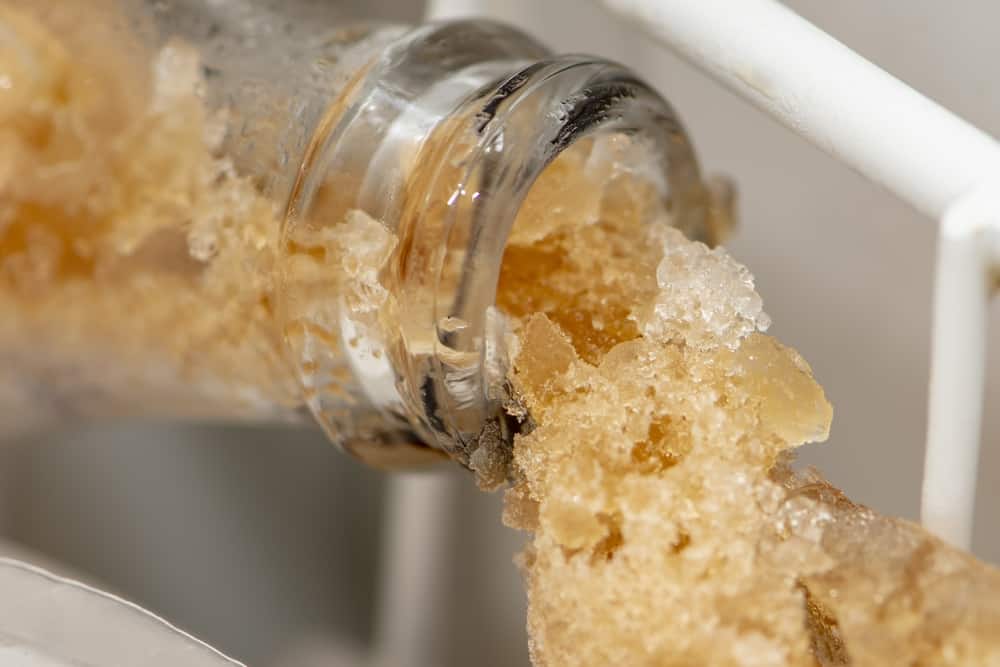
Fortunately, the cap gave way on this bottle prior to the glass bottle shattering
Instead of washing a glass in warm water and then putting it in the freezer, let it cool off on the counter. When it reaches room temperature, you can put it in the freezer.
After the glass freezes, take it out and let it warm up. If you’re making a cocktail in a chilled glass, the liquids should be cool or cold. Pouring warm liquids into a frozen glass can cause it to shatter.
If you’re freezing food in glass cookware, don’t warm it up as soon as you take it out of the freezer. Let the food sit out before you put the container in the microwave.
Or you can transfer the food from the glass container to a saucepan to warm up on the stove.
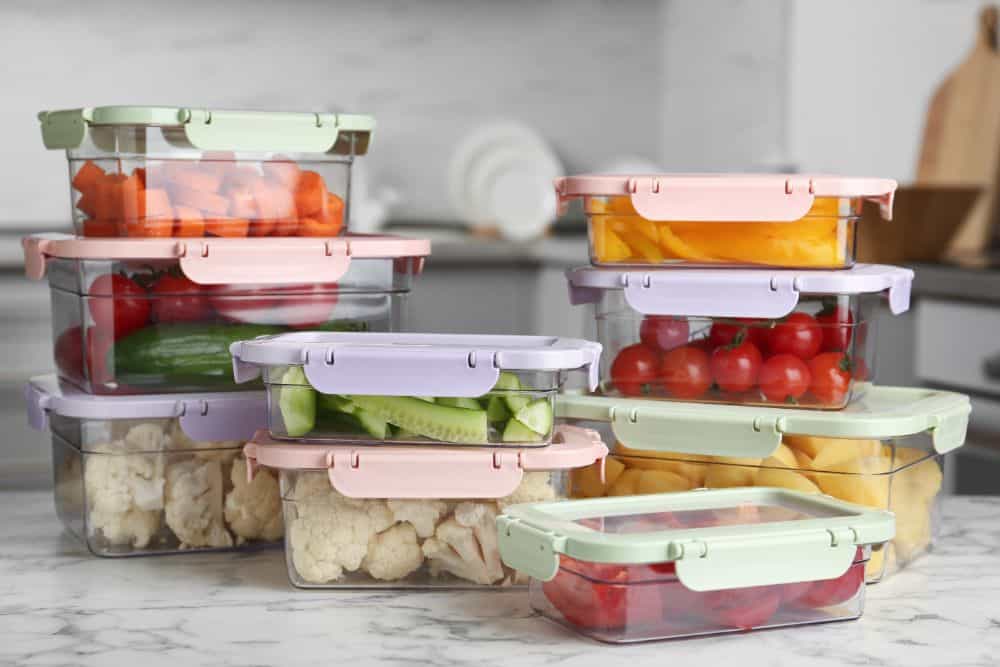
When Freezing Glass Storage Containers, Don't Transfer Directly to the Oven. Thermal Shock Can Occur and Cause Breakage When Glass Containers Change Temperature Rapidly
A non-tempered glass will explode in the freezer because it contains tiny air bubbles. These bubbles expand when the glass freezes and contract when it warms up.
Since they’re inside the glass, they can make it shatter.
Pressure building up in a glass container also makes it likely to explode. Filling a glass container too full leaves the contents with no room for expansion. So, the glass shatters.
Glass can stay in the freezer as long as necessary, as long as you prevent thermal shock. If you’re putting a glass in the freezer for a drink, anywhere from 30 minutes to one hour is enough time to get it chilled.
But if you’re storing food, you can leave it in the freezer for a long time. 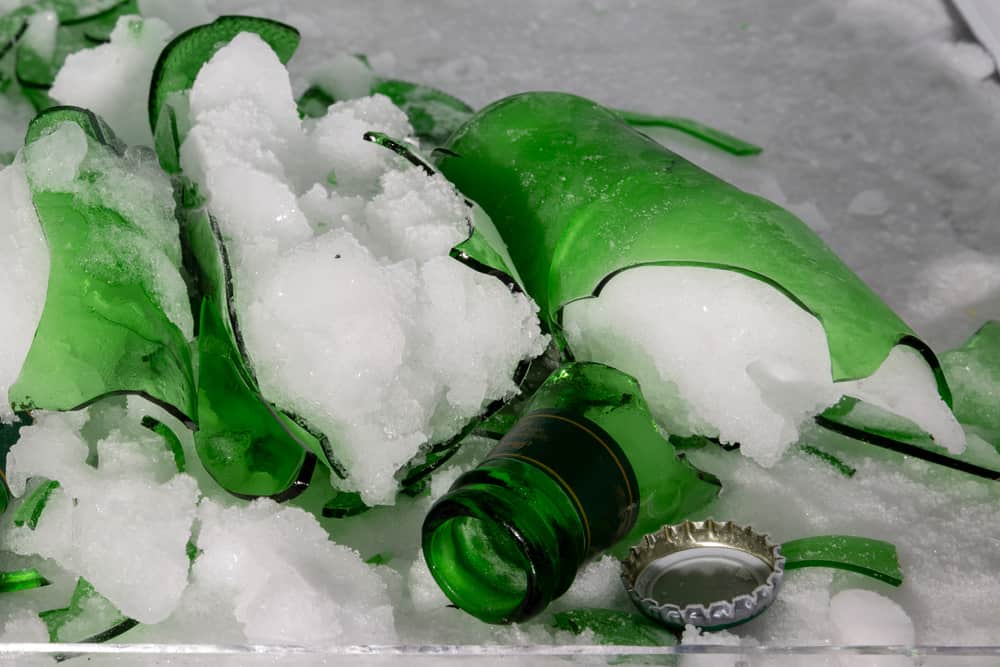
Cleaning up the bottle in this freezer is going to be a complicated process
Remember that food stored in glass containers is more likely to get freezer burn. It takes up to three months for food to develop freezer burn.
If you’re going to store food for several months, consider using airtight freezer bags instead. Glass containers are best for temporary storage.
Certain types of glass are safer to use in the freezer than others. Glass cookware that’s safe to use in the oven is also good to use in the freezer.
However, regardless of the type of glass, you always need to be aware of thermal shock. Never let glass change temperatures too rapidly.
Pyrex glass cookware is oven-safe, so it’s also OK to freeze. This is a nice perk because these glass bakeware containers are convenient for food storage.
They consist of tempered glass with fitted lids. While you don’t want to store food in the freezer for more than a couple of months due to freezer burn, Pyrex keeps it fresh for a long time.
Proper use of Pyrex Cookware
You don’t want to fill any glass container too full, and that rule applies to Pyrex containers. Since the lids are rubber, they allow for minimal expansion, so there’s less risk of the glass exploding.
You want to avoid extreme temperature variations when dealing with any glass (including Pyrex Glass) or else your glassware may suffer from thermal shock and break. Never move any glass bakeware directly from the freezing temperature of the ice chest to the high temperature of an oven.
If you’re storing a liquid in a mason jar, you must remember that the liquid will expand inside the glass jar as it freezes. You can’t fill the jar to the top because it will explode.
Leaving space in the glass jar will give room for freezer burn to form, so canning jars are a better solution for short-term storage.
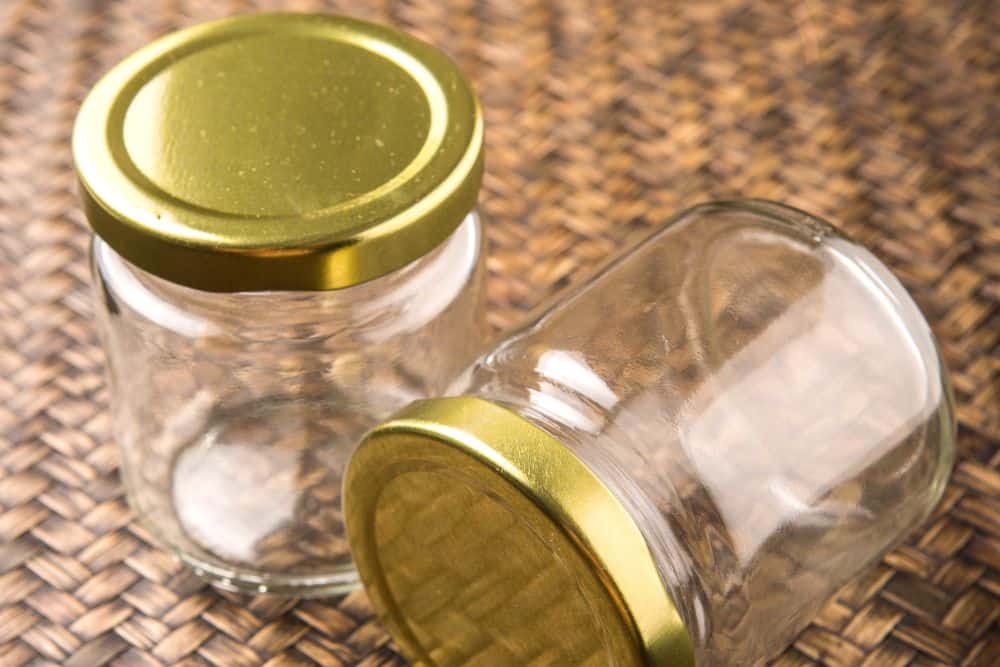
Mason Jars Can be Effective at Freezing Contents for Long Periods of Time - Just Make Sure You Don't Overfill the Jar with Liquids as They Will Expand Upon Freezing
Most mason jars have metal lids, so they keep everything sealed tightly inside. There’s no give for expansion like with a rubber Pyrex lid. (Note that some mason jars are meant for the freezer - like some of the canning jars from Ball).
Make sure you’re filling each glass container in a way that will keep the glass intact.
Drinking glasses aren’t something you’d use for long-term freezer storage since there’s no lid. But if you don’t finish your milkshake or smoothie, you can put the glass in the freezer to prevent the drink from melting.
You can also put a drinking glass in the freezer to chill before having a refreshing beverage. You can put a beer mug in the freezer to have a frosty brew on a hot day.
You’ll still want to pay attention to thermal shock, so the beer you pour should already be cold. Since there’s no lid and the glass isn’t explicitly made for the freezer, you shouldn’t leave drinking glasses in too long.
As long as you know what might cause the glass to explode in the freezer, you can work to prevent it. These tips will help you keep all your glass containers in one piece.
Always change the temperature of the glass slowly to prevent cracks. Don’t put any warm glasses into the freezer, and don’t add hot foods or liquids to frozen glasses.
Check the glass for cracks before you freeze it. If there’s already damage to the glass, the temperature change will make it worse. The glass is weak, so the thermal shock will make it shatter.
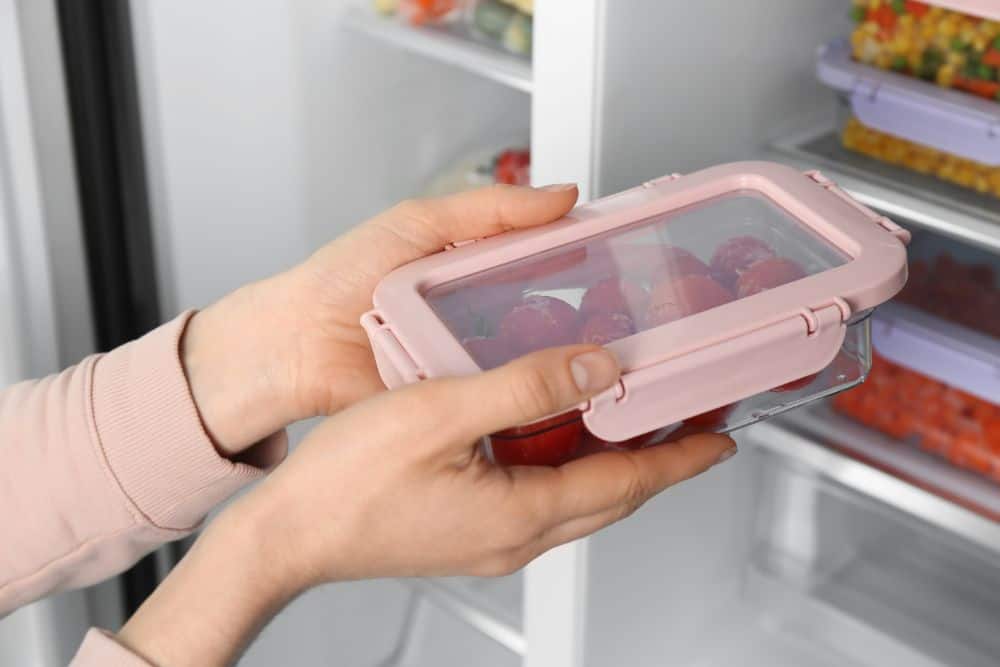
Inspect Glass Storage Containers for Chips and Cracks Which Are Weak Points That Could Cause Breakage When Frozen
Never put a full glass container in the freezer. You need to leave space for the contents to expand as they freeze. The general rule is that an inch or two below the lid allows for expansion.
If you’re using glass containers with lids, don’t put on the lid tightly until the contents freeze. A tight lid will increase the internal pressure.
Leaving the container open gives room for expansion. You can put the lid on after it freezes to keep the contents fresh.
Use glass without shoulders. Shoulders describe the curve near the lid of a glass jar. As the food or liquid freezes, it expands.
It will reach the shoulders and not be able to get past it. The shoulders are a stress point, and the pressure builds up as the contents keep freezing.
It’ll shatter because it can’t expand anymore. If you use this type of jar, allow a bigger gap.
Allow plenty of room around your frozen glass containers. Packing your freezer tightly means the glasses will bump up against each other. If there’s friction, the glass can weaken and shatter when they touch.
You’ve learned the background information necessary to store glass containers in the freezer properly. In case you need more answers, check out these frequently asked questions.
Yes, stainless steel is a great freezer storage option. Many metal tins have fitted lids that keep your food fresh. You should still leave space at the top of the container for the food or liquid to expand as it freezes.
Frozen beer might sound refreshing on a summer day, but you shouldn’t put glass bottles in the freezer. Think of how full a beer bottle is when you buy it. There’s not a lot of room for the liquid to expand in the freezer without shattering the glass.
It’s better to put an empty drinking glass in the freezer to let it chill, then pour in your cold beer after you remove it from the freezer. You can put plastic water bottles in the freezer without worrying about the container deteriorating, though.
You can put some types of glass in the microwave. Check to see if the container has a microwave-safe label. Even if it does, you need to stay aware of thermal shock, just as with freezing glass. Putting a cold or chilled glass in the microwave will ensure it shatters. Always let glass reach room temperature first.
Borosilicate glass is much more resistant to temperature changes and thermal shock than other types of glass cookware. Some companies like Pyrex used to have cookware made of borosilicate glass, but this is no longer the case as they have switched to less costly soda lime glass.
You can move borosilicate glass from the freezer directly to the oven rack without fear of experiencing thermal shock and breakage due to temperature change. Unfortunately, there is a tradeoff. A borosilicate glass food container is more likely to break due to impact (like if you dropped a borosilicate glass baking dish).
